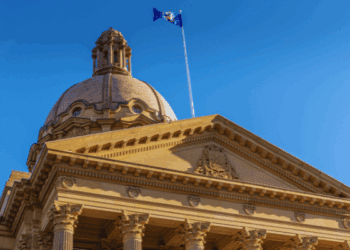FP Comment, June 16, 2011
Constitution requires goods ‘be admitted free’
By Ian Blue
Canadians pay high but hidden costs thanks to interprovincial trade barriers. As countless analyses show, agricultural marketing boards, provincial liquor monopolies, and provincial product regulations are just a few of the many government policies that frustrate trade and make Canadians worse off. While the value of these programs has been questioned for years, the main objection to interprovincial trade barriers should be that they violate the Constitution of Canada – a wrong that remains almost completely ignored. A legal challenge based on contemporary norms of interpretation would likely see the end of such barriers and guarantee freer movement of goods between provinces.
A purposive reading of the Constitution seems to guarantee free trade in goods between the provinces. Section 121 states: “All Articles of the Growth, Produce, or Manufacture of any one of the Provinces shall, from and after the Union, be admitted free into each of the other Provinces.”
Given this unmistakably clear assurance of free trade, Canadians should wonder why the provinces are permitted to maintain trade barriers. The answer lies in a 1921 Supreme Court case: Gold Seal Limited v. The Attorney General of the Province of Alberta (Gold Seal). This case, an example of expediency gone wrong, substantially narrowed the scope and application of section 121. The Court held that the only trade barriers which section 121 protected against were customs posts at provincial borders. In a recently released paper, Free Trade within Canada: Say Goodbye to Gold Seal, I suggest that the interpretation of the case is risibly wrong, contrary to the intention of the framers of the Constitution, and inimical to one of the main purposes of Confederation, namely, to create a strong national economic union with no internal trade barriers.
One of the points I make against the current interpretation of the Gold Seal case relates to the wording of section 121 and specifically focuses on the meaning of the word “free” in the phrase “shall …. be admitted free.”
Legal draftsmen, including Frank Reilly who drafted the BNA Act, rely on precedents. There was ample precedent at the time for a narrow drafting of section 121. Nova Scotia, New Brunswick, and the Province of Canada had all enacted reciprocal statutes that allowed for duty-free entry of products. In other words, British colonies in North America had already drafted narrowly worded laws to prevent duties. But far broader language than simply free “from duty” was used in section 121. The inference from the broader wording is that section 121 was intended to guarantee free trade among the provinces, not just prevent duties.
A second point I develop is the legislative history of section 121. First, the intent of many of the Founders when pursuing Confederation is pretty clear. Take, for example, George Brown’s comments delivered in Halifax on September 12, 1867: union of all provinces would “break down all trade barriers between us,” and throw open all at once “a combined market of four millions of people.” In February 1865, during Parliamentary debates, Sir John A. Macdonald stated that Canada wanted “unrestricted free trade, between people of the five provinces,” and George-Etienne Cartier argued that the most immediate benefits to be derived from the union would spring from the breaking down of [tariff] barriers and the opening up of the markets of all the provinces to the different industries of each.
Another aspect of the legislative history to consider is the many trade-related events that occurred around the time the bill was being drafted. Both before and after Confederation, the wealth of the British North American colonies derived from their ability to export goods. In other words, Canada’s prosperity was already linked to trade even before we were a country. The abrogation of the Reciprocity Treaty with the United States, which had allowed free trade in many goods with the US, was a deciding factor in motivating Confederation. Our Founders understood the economic implications of losing access to the US market and the consequent need for an unrestricted internal market within the new Canada.
This legislative history shows that with section 121, the Fathers of Confederation wanted Canada to be a harmonious economic union with no internal trade barriers. It demonstrates that one of the major advantages seen in Confederation was the creation of a Canada-wide free market.
Section 121 was intended to ensure free trade among provinces. A proper legal analysis of section 121 today would result in the elimination of numerous provincially-erected trade barriers that currently benefit a small minority at the expense of the many.
Ian A. Blue, Q.C. is senior counsel and advisor at Gardiner Roberts LLP in Toronto, and the author of Free Trade within Canada: Say Goodbye to Gold Seal, recently released by the Macdonald-Laurier Institute: www.macdonaldlaurier.ca
Ian Blue can be reached at: iblue@gardiner-roberts.com




